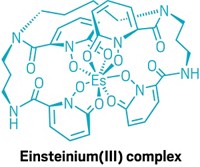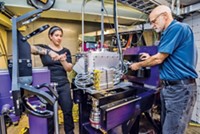Advertisement
Grab your lab coat. Let's get started
Welcome!
Welcome!
Create an account below to get 6 C&EN articles per month, receive newsletters and more - all free.
It seems this is your first time logging in online. Please enter the following information to continue.
As an ACS member you automatically get access to this site. All we need is few more details to create your reading experience.
Not you? Sign in with a different account.
Not you? Sign in with a different account.
ERROR 1
ERROR 1
ERROR 2
ERROR 2
ERROR 2
ERROR 2
ERROR 2
Password and Confirm password must match.
If you have an ACS member number, please enter it here so we can link this account to your membership. (optional)
ERROR 2
ACS values your privacy. By submitting your information, you are gaining access to C&EN and subscribing to our weekly newsletter. We use the information you provide to make your reading experience better, and we will never sell your data to third party members.
Physical Chemistry
Element 114 Confirmed
Eight-day-long atom-smashing experiment reproduces 10-year-old result
by Mitch Jacoby
October 5, 2009
| A version of this story appeared in
Volume 87, Issue 40
Ten years after scientists in Dubna, Russia, first reported synthesizing nuclei of element 114 in a high-energy accelerator, researchers at Lawrence Berkeley National Laboratory have independently confirmed those results, according to a study published in Physical Review Letters (2009, 103, 132502). Reproducing experimental results is the bedrock of the scientific method. Yet the extremely low probability of making superheavy nuclei, which in the case of element 114 was done by firing 48Ca ions into a plutonium target, presented formidable challenges to successfully reproducing the Dubna results. As explained by Kenneth E. Gregorich, who co-led the Berkeley team with Heino Nitsche, eight days of almost continuously bombarding the target with 48Ca ions yielded just two atoms of element 114. The nuclei, 286114 and 287114, which survived for about 0.1 and 0.5 seconds, respectively, before disintegrating, were identified by tracking a series of α-particle emission and fission events that were correlated in time and position in the Berkeley team’s detector. These lifetimes, which are relatively long for superheavy isotopes, are viewed by the scientists as evidence in support of the so-called island of stability—a region on the chart of nuclides where certain proton-neutron combinations may lead to long-lived superheavy isotopes.




Join the conversation
Contact the reporter
Submit a Letter to the Editor for publication
Engage with us on Twitter